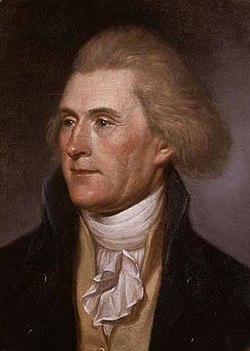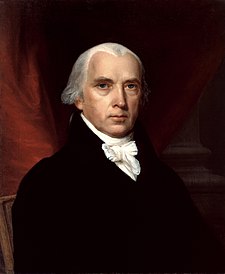

Thomas Jefferson_ _ _ _ _ _ _ _ _ _ _ _ _ _Benjamin Franklin

James Madison

Thomas Jefferson to Nehemiah Dodge, Ephraim Robbins and Stephen S. Nelson,
a committee of the Danbury Baptist Association in the state of Connecticut, January 1, 1802.
Holograph draft letter, 1802
Jefferson Papers, Manuscript Division, Library of Congress (163a)
_________________________
Jefferson's Letter to the Danbury Baptists
The Final Letter, as Sent
Date: Thu, 10 Dec 2009 17:22:49 -0800
To: D, 19, john, secret, barb, Andrew
From: joseph zernik
Subject: Re: If we could just leave the religious stuff out of this....
As stated, attempts to pigeonhole these giants were likely to be futile. My all-time favorite on the subject was Jefferson's letter to the Baptist clergy of Connecticut. Text below was cut and paste from Library of Congress exhibition catalog, and newsletter in 1998. However, I believed that that there was another, much better, full-length scholarly article from Yale Library, in Connecticut, where the manuscript, and the deleted sections of it, were first discovered around the 1990's.
In sum:
The convergence in time and place of key persons counted among the Framers - like Benjamin Franklin , Alexander Hamilton, Thomas Jefferson , James Madison and some others, the fact that such minds prevailed, and that the document that they produced is still lawfully to guide this nation, was an event of unreasonably low statistical odds in the history of mankind.
Joe Zernik
_____________
A Wall of Separation
The celebrated phrase, "a wall of separation between church and state," was contained in Thomas Jefferson's letter to the Danbury Baptists. American courts have used the phrase to interpret the Founders' intentions regarding the relationship between government and religion. The words, "wall of separation," appear just above the section of the letter that Jefferson circled for deletion. In the deleted section Jefferson explained why he refused to proclaim national days of fasting and thanksgiving, as his predecessors, George Washington and John Adams, had done. In the left margin, next to the deleted section, Jefferson noted that he excised the section to avoid offending "our republican friends in the eastern states" who cherished days of fasting and thanksgiving.
He originally wrote "a wall of eternal separation between church and state," later deleting the word "eternal." He also deleted the phrase "the duties of my station, which are merely temporal." Jefferson must have been unhappy with the uncompromising tone of both of these phrases, especially in view of the implications of his decision, two days later, to begin attending church services in the House of Representatives.
A Wall of Separation
The celebrated phrase, "a wall of separation between church and state," was contained in Thomas Jefferson's letter to the Danbury Baptists. American courts have used the phrase to interpret the Founders' intentions regarding the relationship between government and religion. The words, "wall of separation," appear just above the section of the letter that Jefferson circled for deletion. In the deleted section Jefferson explained why he refused to proclaim national days of fasting and thanksgiving, as his predecessors, George Washington and John Adams, had done. In the left margin, next to the deleted section, Jefferson noted that he excised the section to avoid offending "our republican friends in the eastern states" who cherished days of fasting and thanksgiving.
He originally wrote "a wall of eternal separation between church and state," later deleting the word "eternal." He also deleted the phrase "the duties of my station, which are merely temporal." Jefferson must have been unhappy with the uncompromising tone of both of these phrases, especially in view of the implications of his decision, two days later, to begin attending church services in the House of Representatives.

Thomas Jefferson to Nehemiah Dodge, Ephraim Robbins and Stephen S. Nelson,
a committee of the Danbury Baptist Association in the state of Connecticut, January 1, 1802.
Holograph draft letter, 1802
Jefferson Papers, Manuscript Division, Library of Congress (163a)
_________________________
Jefferson's Letter to the Danbury Baptists
The Final Letter, as Sent
To messers. Nehemiah Dodge, Ephraim Robbins, & Stephen S. Nelson, a committee of the Danbury Baptist association in the state of Connecticut.
Gentlemen
The affectionate sentiments of esteem and approbation which you are so good as to express towards me, on behalf of the Danbury Baptist association, give me the highest satisfaction. my duties dictate a faithful and zealous pursuit of the interests of my constituents, & in proportion as they are persuaded of my fidelity to those duties, the discharge of them becomes more and more pleasing.
Believing with you that religion is a matter which lies solely between Man & his God, that he owes account to none other for his faith or his worship, that the legitimate powers of government reach actions only, & not opinions, I contemplate with sovereign reverence that act of the whole American people which declared that their legislature should "make no law respecting an establishment of religion, or prohibiting the free exercise thereof," thus building a wall of separation between Church & State. Adhering to this expression of the supreme will of the nation in behalf of the rights of conscience, I shall see with sincere satisfaction the progress of those sentiments which tend to restore to man all his natural rights, convinced he has no natural right in opposition to his social duties.
I reciprocate your kind prayers for the protection & blessing of the common father and creator of man, and tender you for yourselves & your religious association, assurances of my high respect & esteem.
Th Jefferson
Jan. 1. 1802.
_________________________
At 14:58 10/12/2009, DEste wrote:
At 14:58 10/12/2009, DEste wrote:
In a message dated 12/10/2009 1:05:03 P.M. Pacific Standard Time, 19range writes:i take exception to these statements...to the contrary when you do not have god in your government then you had failed.
- If this is a Christian nation governed by Christian principles, the God-stuff is not only unnecessary but harmful...
neither was jefferson irreligious.
No comments:
Post a Comment